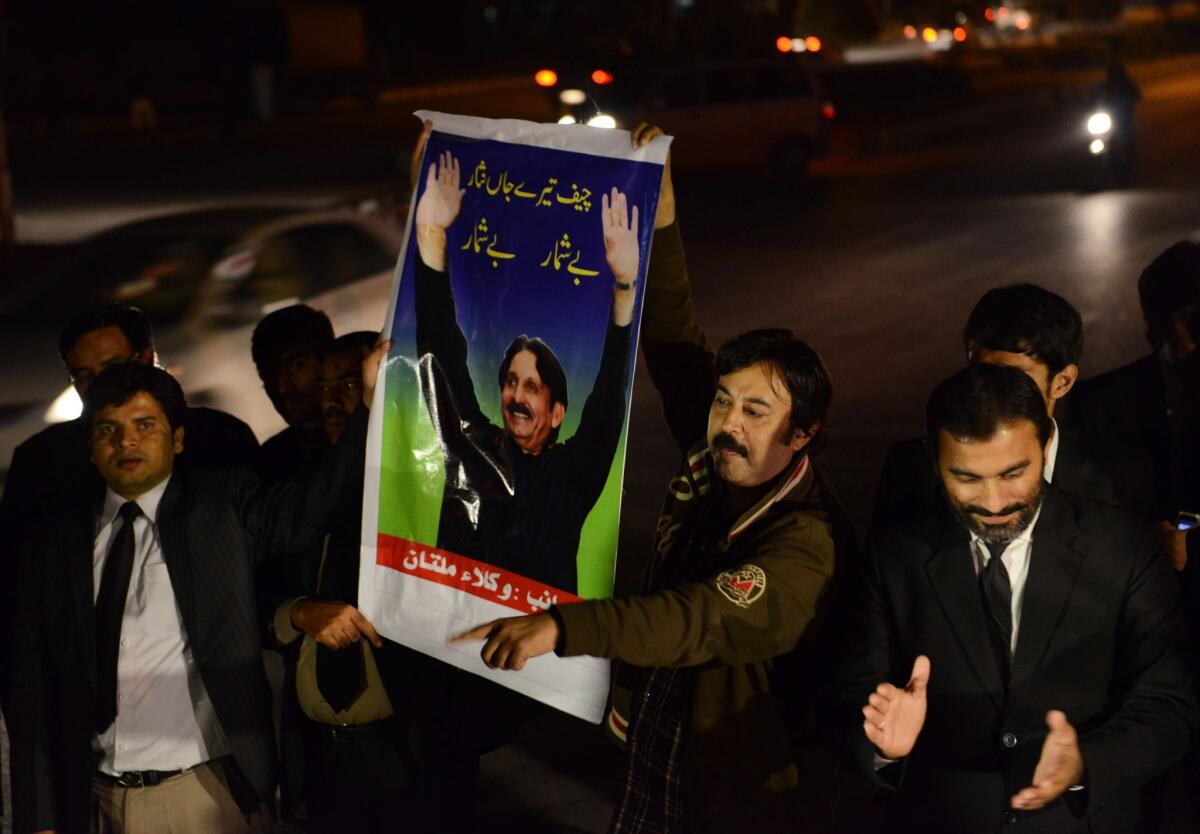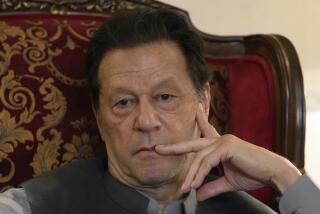Pakistan’s controversial chief justice steps down

ISLAMABAD, Pakistan — Pakistan’s controversial chief justice, who helped oust President Pervez Musharraf and broaden human rights even as critics accused him of overstepping his mandate, retired Wednesday.
The assertive Chief Justice Iftikhar Mohammed Chaudhry, who turns 65 on Thursday, leaves behind a mixed legacy. He’s credited with strengthening the judiciary and making it a force to be reckoned with among politicians and bureaucrats. But he was also instrumental in the resignation of the popularly elected Prime Minister Yousuf Raza Gilani, forced to quit after refusing to reopen a corruption case against then-President Asif Ali Zardari at the behest of the Supreme Court.
“He was instrumental in making the Supreme Court powerful, but couldn’t deliver on much-needed judicial reforms or in clearing the backlog of cases,” said Raza Rumi, an Islamabad-based political commentator. “He remained committed to constitutional rule. But the conduct of the Supreme Court under him undermined the role of parliament and the cabinet.”
The Geneva based International Commission of Jurists, a global organization of 60 eminent judges and lawyers, said this month that the court under Chaudhry strengthened human rights but added that an inconsistent choice of cases left it vulnerable to accusations of partisan intervention. This raised concerns that the court has “sometimes exercised its original jurisdiction in a political and partisan manner,” the group added.
Chaudhry was twice sacked by Musharraf, who came to power in 1999 in a coup, only to be reinstated both times with support from the public, most notably in 2009 in the wake of a protest movement led by the nation’s lawyers.
He was credited with using his high-profile position to pressure the army and government on issues of corruption, illegal detentions and human rights. But critics also say he dipped into the political arena in areas beyond the judiciary’s domain.
His activist approach and use of suo motu provisions, which allow the court to initiate cases it deems worthy, encouraged a host of human rights cases. In 2004, the year before he was nominated, the Supreme Court received 450 human rights case petitions. By 2011, it fielded more than 150,000 petitions.
In a speech marking his retirement Wednesday, Chaudhry expressed hope that Pakistan’s judiciary would continue to strengthen democracy, rule of law and the constitution even as he used the opportunity to rail against cronyism and white-collar crime.
“White-collar crime is a particularly malevolent species of crime,” he said in a speech at the Supreme Court building in Islamabad. “Its effects are wide-ranging and affect the public at large because of the billions that are sapped from the national exchequer.”
Chaudhry was born Dec. 12, 1948, and attended school in Quetta, the capital of southwest Baluchistan province. He got his law degree in southeastern Sindh province and was named to the Supreme Court in 2000.
Five years later he was appointed chief justice. He attracted national attention in 2007 when Musharraf sacked him, only to be reinstated two years later.
His replacement is Tassaduq Jillani, the next most senior judge on the top bench.
ALSO:
U.S. suspends non-lethal aid to Syrian rebels in north
Family, dignitaries pay tribute as Nelson Mandela lies in state
In pioneering experiment, Uruguay nationalizes marijuana trade
Twitter: @markmagnier
Special correspondent Sahi reported from Islamabad and Magnier from New Delhi.
More to Read
Sign up for Essential California
The most important California stories and recommendations in your inbox every morning.
You may occasionally receive promotional content from the Los Angeles Times.










